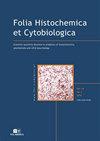Psoralen inhibits the proliferation and promotes apoptosis through endoplasmic reticulum stress in human osteosarcoma cells.
IF 1.7
4区 生物学
Q4 BIOCHEMISTRY & MOLECULAR BIOLOGY
引用次数: 6
Abstract
INTRODUCTION . Psoralen is a main active component of Psoralea corylifolia Linn. (Leguminosae). Psoralen has been reported to show antitumor effects and activity to accelerate osteoblastic proliferation. Nevertheless, the antitumor mechanism of psoralen in osteosarcoma has never been elucidated. The current study is aimed to investigate the therapeutic function of psoralen in human osteosarcoma cells and its potential regulatory mechanism. MATERIAL AND METHODS Effects of psoralen (0-70 μg/mL) on the viability of two osteosarcoma cell lines cultured for 48 h was evaluated by MTT assays. The concentration of IC₁₀ (8 μg/mL for MG-63 cells and 9 μg/mL for U2OS cells) was regarded to be a non-cytotoxic dose selected as the working concentration in the subsequent experiments. Effects of psoralen on cell proliferation for 48 h was assessed by colony formation assays. Flow cytometry analyses were performed to measure cell cycle and apoptosis. RT-qPCR and Western blotting were carried out to assess RNA expression and protein levels of endoplasmic reticulum (ER) stress associated factors. RESULTS Psoralen inhibited osteosarcoma cell viability (IC₅₀ 25 μg/mL for MG-63 cells and IC₅₀ 40 μg/mL for U2OS cells) in a dose-dependent manner and growth inhibition rate reached the highest level when cells were treated with 70 μg/mL psoralen. Psoralen induced cell cycle arrest in the G0/G1 phase and promoted apoptosis of both MG-63 and U2OS cells. The treatment of psoralen resulted in an increase in ATF-6 and CHOP protein levels as well as a decrease in Bcl-2 protein level, indicating that cell apoptosis induced by psoralen was associated with ER stress. Treatment with 4-PBA, the ER stress inhibitor, attenuated the ability of psoralen to promote apoptosis of MG-63 and U2OS cells. CONCLUSIONS Psoralen showed growth-inhibitory effects in osteosarcoma cells, and induced apoptosis via the ER stress pathway, which might be a potential drug to suppress the development of osteosarcoma.补骨脂素通过内质网应激抑制人骨肉瘤细胞增殖并促进细胞凋亡。
介绍。补骨脂素是补骨脂的主要活性成分。(豆科)。据报道,补骨脂素具有抗肿瘤作用和促进成骨细胞增殖的活性。然而,补骨脂素在骨肉瘤中的抗肿瘤机制尚未阐明。本研究旨在探讨补骨脂素对人骨肉瘤细胞的治疗作用及其潜在的调控机制。材料与方法采用MTT法观察补骨脂素(0 ~ 70 μg/mL)对培养48 h的2株骨肉瘤细胞株细胞活力的影响。将IC₁₀浓度(MG-63细胞为8 μg/mL, U2OS细胞为9 μg/mL)作为非细胞毒性剂量,作为后续实验的工作浓度。通过菌落形成试验评估补骨脂素对48 h细胞增殖的影响。流式细胞术检测细胞周期和凋亡情况。采用RT-qPCR和Western blotting检测内质网应激相关因子的RNA表达和蛋白水平。结果补骨脂素以剂量依赖的方式抑制骨肉瘤细胞活力(MG-63细胞的IC₅₀25 μg/mL, U2OS细胞的IC₅₀40 μg/mL),当细胞用70 μg/mL补骨脂素处理时,生长抑制率达到最高水平。补骨脂素诱导细胞周期阻滞于G0/G1期,促进MG-63和U2OS细胞凋亡。补骨脂素处理导致ATF-6和CHOP蛋白水平升高,Bcl-2蛋白水平降低,提示补骨脂素诱导的细胞凋亡与内质网应激有关。内质网应激抑制剂4-PBA可减弱补骨脂素促进MG-63和U2OS细胞凋亡的能力。结论补骨脂素对骨肉瘤细胞具有生长抑制作用,并通过内质网应激途径诱导细胞凋亡,可能是抑制骨肉瘤发展的潜在药物。
本文章由计算机程序翻译,如有差异,请以英文原文为准。
求助全文
约1分钟内获得全文
求助全文
来源期刊

Folia histochemica et cytobiologica
生物-生化与分子生物学
CiteScore
2.80
自引率
6.70%
发文量
56
审稿时长
6-12 weeks
期刊介绍:
"Folia Histochemica et Cytobiologica" is an international, English-language journal publishing articles in the areas of histochemistry, cytochemistry and cell & tissue biology.
"Folia Histochemica et Cytobiologica" was established in 1963 under the title: ‘Folia Histochemica et Cytochemica’ by the Polish Histochemical and Cytochemical Society as a journal devoted to the rapidly developing fields of histochemistry and cytochemistry. In 1984, the profile of the journal was broadened to accommodate papers dealing with cell and tissue biology, and the title was accordingly changed to "Folia Histochemica et Cytobiologica".
"Folia Histochemica et Cytobiologica" is published quarterly, one volume a year, by the Polish Histochemical and Cytochemical Society.
 求助内容:
求助内容: 应助结果提醒方式:
应助结果提醒方式:


